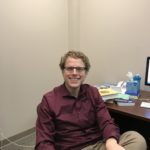A former soldier, a polyglot with command of 10 languages, and a podcast creator are three of Hillsdale College’s new hires in the Classics department this semester.
After serving in the U.S. Army from 1998 to 2004, Carl Young received his bachelor’s in classics at the University of New Mexico and his doctorate in classical studies at Duke University, where he taught for a year before coming to Hillsdale.
Young, a visiting assistant professor of classics, specializes in philosophy, especially the works of Plato and Nietzsche, and currently teaches introductory Latin, 300-level Greek, and Greco-Roman literature and culture.
Young became familiar with Hillsdale through his father’s “Imprimis” subscription. The first in his family to leave Richmond County, South Carolina, he came from a long line of law enforcement officers and was expected to follow suit. Instead, he pursued a career in academia.
Young met Professor of Classics Laury Ward while pursuing his doctorate at Duke University. When Ward accepted a position in the Classics department, Young began to research Hillsdale and found himself drawn in by the mission statement.
“I told Professor Ward that she got my dream job,” said Young. “I am so gracious to her, as she kept me in the loop about Hillsdale, especially job opportunities.”
Young enjoys the communal spirit of the campus, especially the veterans’ community. Additionally, he appreciates students’ willingness to dive into tough topics.
“I love the random conversations that you can fall into,” said Young. “I’ve been very delighted and surprised by the students here as well. If a controversial subject comes up in class, Hillsdale students really get in there and have it out. I love that.”
Young is not the only new professor who appreciates the students’ willingness to dive deep into difficult subjects.
Joshua Fincher grew up in Washington state and attended the University of Washington, where he got his bachelor’s degree in Classics. He then got a Master of Arts, Master of Philosophy, and doctorate in Classics at Yale, where he also served as the student-faculty liaison. He taught a seminar on classical heros for a year at Princeton.
Fincher, a visiting assistant professor of classics, has studied a total of ten languages: English, French, German, Chinese, Greek, Latin, Hebrew, Sanskrit, an ancient Eastern-Iranian language called Avestan, and Ugaritic, used to study the Hebrew Bible. He uses these to engage in comparative study of ancient texts, looking for cultural connections and commonalities between civilizations.
According to Fincher, college education should expose students to the material and teach them how to learn. He said he hopes college education provides students with the tools to create their own worldview.
“One thing that I like about Hillsdale is that there is a much more positive attitude about the process of worldview creation,” Fincher said.
Fincher found his passion for teaching as a freshman in high school, where he helped his fellow classmates with studying advanced history. As a junior, he interned as a teaching assistant for a high school U.S. history course. Since that time, Fincher knew he wanted to work with students.
“I picked this job because the sort of intense intention that I pay to students in helping them through these educational journeys, which, at larger schools, is valued in what people say but not in practice,” Fincher said. “It is good to know that Hillsdale wants the same things that I do for education and for students.”
Scott Lepisto hails from Michigan. He received his bachelor’s in Classical Languages and Literature from the University of Michigan, and then his Masters and doctorate from the University of Southern California. Lepisto is interested in the concept and use of logos in prophetic speeches, specifically when characters give voice to the divine.
Lepisto, a lecturer in classics, currently teaches beginning and intermediate Latin, as well as an advanced seminar on the letters of Seneca, a Roman stoic and philosopher. One of his strengths includes analyzing literature. He emphasizes this in his classes through demonstration and question-and-answer-style teaching, which he talks about on his podcast, Itinera.
“I think about this Itinera podcast as an approach to the field. It makes it seem more accessible,” Lepisto said. “Give me a text and I will show you what is so cool about it.”
He teaches the skills of analysis, which he hopes students can then apply to art and texts across time.
When asked about his favorite part of Hillsdale so far, Lepisto said that it’s the students.
“I love the students…they are very virtuous and working hard is a norm,” said Lepisto. “This is a bright group in general.”
Editor’s note: Itinera can be found on iTunes and Twitter @scottlepisto.




